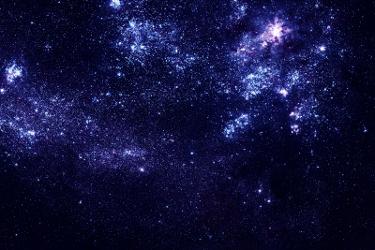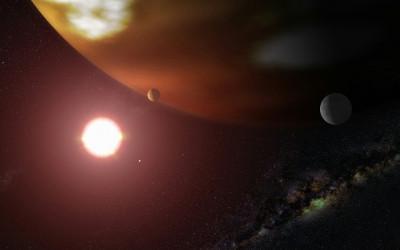OU researchers support Euclid Dark Energy Satellite Mission to Map the Universe

The European Space Agency's (ESA) Euclid flagship Dark Energy Satellite Mission launched from Cape Canaveral in Florida on Saturday 1 July 2023, on a SpaceX Falcon 9 rocket.
The OU’s Centre for Electronic Imaging (CEI) has been supporting preparations for the mission for the last 15 years through developing detectors.
Euclid’s six-year mission is to map the dark Universe, using the positions of galaxies and images of dark matter produced from the gravitational lensing distortions of distant galaxies. The galaxy and dark matter maps contain information about the expansion history of the Universe and the evolution of the structure within it. By analysing these maps, astronomers will be able to determine the nature of both dark matter and dark energy. Dark matter, which unlike normal matter does not reflect or emit light, binds together galaxies creating the environment for stars, planets and life, while dark energy is the mysterious new phenomenon which is pushing galaxies away from each other and causing the expansion of the Universe to accelerate.
To achieve this, the Euclid Consortium team will carry out a very precise and accurate analysis of the images and distances of 1.5 billion galaxies over one-third of the sky. Gravitational lensing causes a one part in a hundred change in these galaxy images, which need to be measured from the sample to a precision of one part in a hundred thousand, presenting a major data-analysis challenge. Euclid will also measure the spectrum of light from over 35 million galaxies to accurately measure their distance from Earth.
To carry this out the Euclid satellite hosts two state-of-the-art instruments, an optical camera (VIS) built in the UK, and a Near-Infrared (NISP) camera led by France. The VIS Instrument will take images as sharp as those from the Hubble Space Telescope (HST) to measure the gravitational lensing distortions. The NISP Instrument will take multicolour images and the spectrum of light of galaxies from which their distance can be measured. Euclid’s wide field of view and large instruments will allow it to image more area of sky in one day than HST in its first 25 years.
The OU’s CEI has been involved in developing the detectors for the VIS instrument and testing how they will perform in the harsh radiation environment in space. The team will continue to monitor the detectors during the mission, to help mitigate the effects of the damage caused by high energy particles outside the Earth’s protective atmosphere, allowing Euclid to return the best possible science for the mission lifetime.
Dr Jesper Skottfelt, who led the CEI team at the OU commented on how monumental the mission launch feels:
"After 15 years of CEI involvement in the Euclid mission, it is exciting to see the spacecraft being launched. The high performing detectors will equip Euclid to answer some of the most fundamental questions about the universe."
"The team at the CEI has been involved in developing the detectors and testing how they will perform in the harsh radiation environment in space. We will continue to monitor the detectors during the mission, to help mitigate the effects of the damage caused by high energy particles outside the Earth's protective atmosphere."
After launch Euclid will travel over one million miles into space away from the Sun, where the combined gravity of the Sun and Earth will cause it to orbit the Sun once a year, in step with the Earth. It will scan the sky and send many petabytes of data back to ESA’s ground stations. From there Euclid’s data is distributed across nine Euclid Science Data Centres located in Europe, and one in North America. The UK’s Science Data Centre is hosted in Edinburgh. The Data Centres will process the Euclid data, along with data from complementary ground-based astronomical surveys, day and night, ready for teams of scientists to work on, with the results released to the public.
You may also be interested in:
A version of this story, written by Laura Bandell, originally appeared on OU News.
Contact our news team
For all out of hours enquiries, please telephone +44 (0)7901 515891
Contact detailsNews & articles

OU researchers lead international advances in planetary protection
Open University researchers are leading international advances in planetary protection, helping ensure that space exploration is safe, sustainable, and scientifically rigorous.